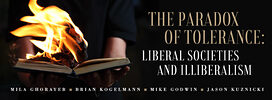In his reply to Mila Ghorayeb’s piece, Jason Kuznicki argues that Ghorayeb’s focus on restricting the participation rights of the antidemocratic is misguided. Ghorayeb argues that, when faced with an antidemocratic group who seeks to prevent others from participating in democratic politics, it is permissible to restrict the participation rights of the antidemocratic group first. I have already responded to Ghorayeb’s main argument. In what follows, I would like to examine Kuznicki’s response to Ghorayeb.
Kuznicki responds to Ghorayeb in two steps. First, he notes it is peculiar that all her focus is on antidemocratic groups who wish to restrict the participation rights of others. After all, antidemocratic groups can do great harms to others without ever threatening their participation rights. A political party, Kuznicki notes, could be “deeply illiberal, and thus inimical to democracy, without denying anyone citizenship, voting rights, or party membership.” Such a party is just as concerning as one who wishes to restrict the participation rights of others. Hence, “the problem of democratic exclusion is a subset of a larger problem, namely that of unequal civil rights.”
Once we realize that the problem of democratic exclusion is a subset of the larger problem of unequal civil rights, Ghorayeb’s proposal seems misguided. After all, when an illiberal group seeks to restrict the free speech rights of others, our response isn’t to prevent the illiberal group from participating in politics. Our response is to pound our fists on the First Amendment. Similarly, when we encounter an antidemocratic group who seeks to restrict the participation rights of others, our response shouldn’t be disenfranchisement, but rather upholding prespecified rights. As Kuznicki phrases it, instead of restricting the participation rights of illiberal groups, “we could establish a constitutional requirement that the rights we have articulated take more than a simple majority vote to restrict. We might require a supermajority, an absolute majority plus a majority of a majority of districts, or a majority in two or more differently chosen representative bodies.” Indeed, we could go even further, and enshrine voting rights in the Constitution, as we do the right to free speech.
Kuznicki’s proposal is thus the old solution of constitutionally limited government, coupled with checks and balances. If the system of government is designed properly, then there is no need to restrict the participation rights of the antidemocratic. The antidemocratic, even if they win power, will be unable to advance their illiberal agenda. I agree with nearly all of what Kuznicki says. In general, for reasons I have already articulated, we should be deeply skeptical of proposals to restrict the participation rights of anyone, be they democratic or antidemocratic. Protecting minority groups is best done through constitutional rights, coupled with checks and balances.
Nonetheless, I do believe there is a limit to Kuznicki’s solution. In particular, constitutions designed to protect liberal rights will do so only if a sufficient number of persons populating the government are liberal. If there are not enough persons in government committed to the liberal project, then constitutional guarantees don’t mean much. As such, Ghorayeb might respond to Kuznicki by arguing that we may need to restrict participation rights in certain cases, in order to ensure that our liberal government can continue to function in a liberal manner, which includes protecting minority rights.
Central to my argument here is the claim that constitutions designed to protect liberal rights will do so only if a sufficient number of persons who populate the government are liberal. There are historical examples that bear out this claim. Consider, for instance, the history of First Amendment jurisprudence in the United States. In 1798, the 5th Congress and President John Adams passed the Sedition Act, which made it illegal to publish “false, scandalous, or malicious writing” against the government of the United States. Many of us today would agree that such a law violates the First Amendment. Nonetheless, the legislature passed it, and the executive signed it. What is more, the judiciary actually enforced it. People were fined and some spent time in prison for criticizing the U.S. government.
If it means anything, the First Amendment protects the right to criticize one’s government. So what went wrong in 1798? The simple answer is that there just weren’t enough people committed to the ideal of free speech serving in government. There weren’t enough people in the Congress committed to free speech, the President wasn’t committed to it, nor was the judiciary. With no one to uphold it, the First Amendment wasn’t worth the paper it was written on.
The point I am making here is that constitutionally protected rights and structures of government can only do so much. At the end of the day, you need the right sorts of people inhabiting the government who will uphold the liberal rights we care so much about. So, Ghorayeb might reply to Kuznicki that we can permissibly restrict the participation rights of the antidemocratic, because if we don’t do so then our constitutional rights and checks and balances (that Kuznicki places his hope in) will all be for naught.
There is, however, something of a paradox going on here with Ghorayeb’s hypothetical reply to Kuznicki. As I have articulated it, Ghorayeb might argue that we should restrict the participation rights of the antidemocratic to ensure that we have enough liberal persons willing and able to uphold our liberal system of government. Yet, if there are so many illiberal persons in government that our constitutional rights are at risk of not being enforced, then it’s hard to see how that same government will pass laws that restrict only the antidemocratic and illiberal from participating. That is, a government at the brink of doing something like passing the Sedition Act of 1798 will be a government unable to exclude only the illiberal from participating. So, though Ghorayeb has a response to Kuznicki that works in principle, how it works in practice is another matter.

